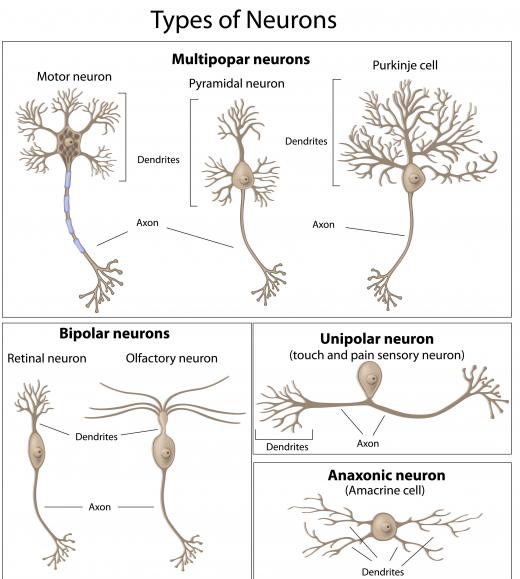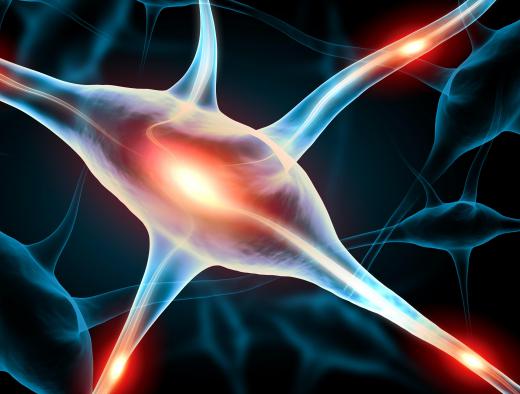What is a Neuron?
 Mary McMahon
Mary McMahon
A neuron is a highly specialized cell that is capable of conducting information in the form of neurotransmitters, chemical signals that can trigger a variety of activities or responses. These cells operate in a binary fashion: they are either on or off, depending on which neurotransmitters they have received. They are the building blocks of the nervous system, including the brain, spinal cord, and individual nerves of the body. There are several different types of these cells, and they are designed for specific activities, ranging from the cells that cluster together to make the gray matter of the brain to the motor neurons at the tip of the toes.
Every neuron has a cell body, known as the soma, that contains a number of organelles, along with dendrites, extensions that can receive information as it is transmitted to the cell. Type I neurons also have an axon, a long tail that can emit neurotransmitters when the cell is excited, while Type II cells lack this feature, or have significantly shorter axons. The axon and dendrites may emerge from opposite ends of the cell body, or the same end, depending on the type of neuron and its location.

The three main kinds are motor, sensory, and interneurons. A motor neuron carries data from the central nervous system to the rest of the body, while sensory neurons return sensory data along an afferent pathway, meaning that they move information towards the brain. Interneurons can allow motor and sensory neurons to communicate directly.
Within these basic categories, the cells can also be classified by shape and function. Some examples of specific types include pyramidal, basket, anterior horn, medium spiny, granule, and Renshaw cells. These cells can be found in various parts of the nervous system, performing different functions, from regulating breathing and other autonomic tasks to interpreting visual information. When someone reads, for example, sensory neurons in several areas of the brain fire as the brain interprets the visual image, deciphers the writing, and converts the written words into understandable language.

Somewhat unusually, neurons do not divide and replicate themselves like other cells of the body do. Those in the brain cannot replace or repair themselves when they are damaged, although the brain can sometimes remap itself to accommodate damage and function normally. Some cells, such as those found in the arms, can regrow parts of themselves, which is why a severe injury sometimes causes a loss of sensation that slowly returns over time as the nerves recover.
AS FEATURED ON:
AS FEATURED ON:















Discussion Comments
@GigaGold
I disagree, I think that we will need to intuit new methods of understanding, much like Einstein did with Quantum Physics and General Relativity, as we progress farther and farther from concepts which we are used to. Sure, science will help us at that point, but the rules of science might have to be completely shifted there.
@Proxy414
I think that the process of understanding how the brain works will come to light and be fully understood using the scientific process. Science and logic have taken us so far, I don't think that they will leave us now.
The entire process of understanding how a neuron works is ultimately beyond us. I think that there is a spiritual unconscious aspect to the brain of every person that is meta-dimensional. What this means is that, like the light experiments we conduct, experiments on the human mind will not make sense on a conscious level. The rules will seem to shift as we learn more and more. Is light a wave or a particle? Why does it change its behavior when we try to observe it? This is all because our small rules of science can't be wrapped around the larger metaphysical picture.
I think that the process of intuition is due to the interneurons bridging different parts of the brain and making analogical connections in different areas. As we mimic the pattern of creation, we are enabled to manipulate it and make new things that draw on the larger analogies of the world. This is how humans are "godlike."
Post your comments